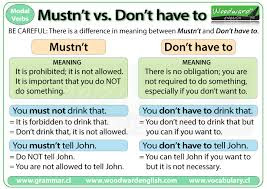
Hi, Guys!,
Modals... are they easy or difficult? Well, before doing any exercises, you need to read the following chart carefully. Then, you can practise Modals with the following activities.
M O D A L V E R B S
ABILITY: can, could, be able to.
Pres. Past Fut. & Pres. / Logro
1. Can you swim?
2. I can’t open this bottle.
3. She could swim when she was five.
4. I’d like to be able to play the piano.
5. I won’t be able to remember your phone number.
PERMISSION: can, could, may, be allowed to.
Asking for permission:
1. Can I borrow your pen, please?
2. Could I use your phone, please?
3. May I make a suggestion?
Talking about permission:
1. You can / are allowed to drive a car in Britain when you are 17.
2. When we were children, we could/were allowed to stay up late on Saturday nights.
OBLIGATION: and NECESSITY: must, have to, have got to.
There is sometimes a difference between must and have to:
Must: when you say what you think is necessary, when you are giving your opinion.
Have to: when you are not giving your personal opinion, but just facts.
1. The government really must do something about unemployment.
2. I must write to ann. I haven’t written to her for ages. 
3. Ann’s eyes are not very good. She has to wear glasses for reading.
At our school, we have to wear a uniform.
We only use must to talk about the present and the future. When we talk about past obligation or necessity, we use had to. I had to work late yesterday.
Mustn’t / don’t have to.
Mustn’t: prohibition. You mustn’t drive without a licence.
Don’t have to: when it is not necessary to do something. You don’t have to wash that shirt. It isn’t dirty.
Don’t have to = don’t need to, needn’t. I needn’t / don’t need to get up early. It’s Sunday.
POSSIBILITY: may, might, could.
To talk about present or future possibility.
1. “There’s someone at the door” “It may be Sarah.” (= Perhaps it is Sarah)
2. President Jones might win the election. (= Perhaps he will win the election)
3. “Where’s Simon?” “He could be in the living-room.” (= Perhaps he is there)
Negatives: may not, might not /mightn’t, but not could not with this meaning.
4. Simon may not be in the living-room.
Note the form: may / might / could + be + ….-ing.
5. They may be having dinner at the moment. (= Perhaps they are having dinner)
CERTAINTY OR DEDUCTION: must, can’t.
1. He must know London very well. He has lived there for a long time.
(= I am sure that he knows London very well)
2. There is a light on in the house, so someone must be at home. (= I am sure that someone is at home)
3. She can’t be in Italy! I saw her today! (= It is impossible that she is in Italy)
4. You’ve just had lunch. You can’t be hungry. (= It is impossible that you are hungry)
ADVICE: should, ought to.
(+common than ought to)
1. I think you should talk to your teacher about it.
2. You ought to stop smoking.
3. You shouldn’t tell lies.
We also use these verbs to say what we think is right or good.
1. I think the police should arrest hooligans.
2. What do you think I ought to do?





























